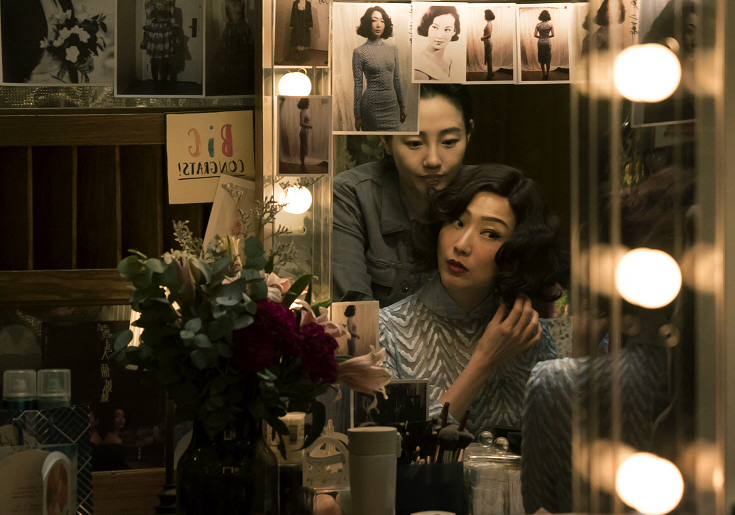Busan Film Review: ‘First Night Nerves’
By Peter Debruge
LOS ANGELES (Variety.com) – Audiences looking for the next “Crazy Rich Asians” might take some delight in Stanley Kwan’s diva-licious “First Night Nerves,” a “Feud”-like behind-the-scenes rivalry which forces center stage all the drama between high-maintenance Hong Kong actresses Yuan Xiuling (Sammi Cheng) and He Yuwen (Gigi Leung). Set during the final week of rehearsals for a new play called “Two Sisters,” the film feels soapier than a broken dishwasher, but that’s not necessarily a bad thing for audiences who relish the chance to watch actresses display their full range of emotion in a movie that gives even the smallest female parts more dimension than most movies offer their ostensible leading ladies.
One of Hong Kong’s only openly gay directors, Kwan has crafted a movie that’s nearly Almodóvarian in the appreciation and respect it showers upon ladies of all classes — not just the city’s Ferrari-driving super-elite, but also the loyal assistants who cook and console our dueling stars. If only he also shared the Spanish helmer’s gift for screenwriting and style. “First Night Nerves” is a dense and sometimes dauntingly overloaded melodrama for which it might be helpful if someone could pause the narrative every few minutes to re-explain the intricacies of how everybody connects.
The film opens with a press conference at Hong Kong City Hall (a historic arts location, very nearly demolished and now under renovation), during which Kwan dumps nearly all the characters in our laps at once: The play is kind of a big deal because it marks the return to acting of Xiuling, who “retired” five years earlier and has now agreed to share the stage with the fellow actress who eclipsed her. With her short haircut and attention-grabbing fashion sense, Yuwen has a spunkier, more modern attitude, and though her reputation is for stealing the limelight, the truth is, she’s intimidated by her co-star. Add to that Cheng Cong (Angie Chiu), the chic Shanghai millionaire bankrolling the production; the show’s trans writer-director, Ouyang An (Kam Kwok Leung); busybody theater manager Mao (Kiki Sheung); and ultra-cool, independently wealthy lesbian bachelorette Fu Sha (Bai Baihe) who’s permitted to hang around in the actresses’ dressing rooms because she’s crazy-rich and kind of a blast to have around.
The standout of that ensemble is An, whom none of the characters quite know how to address, but whose responsibility it is to mediate between her two stars. On one hand, her period set “Two Sisters” play — a catty Anton Chekhov/Tennessee Williams hybrid which she continues to revise right up until opening night — offers sparring opportunities aplenty for both actresses, although Yuwen has only 207 lines, while Xiuling gets double as many (Yuwen counted).
Needy and narcissistic, these two may be drama queens, but “First Night Nerves” is nothing if not a love letter to such icons, conceiving their game of one-upswomanship in such a way that each new ploy to steal the spotlight serves to reinforce rather than undermine the actresses in our eyes. Consider Xiuling’s big crying scene. At the end of day two, the widowed actress reveals (to us, since the information was apparently reported widely by tabloids at the time) how she still mourns her late husband — this despite the fact the scoundrel (and Cong’s brother, through some unexplained coincidence) died in a fiery plane crash with his mistress, who bore him two children. Cut to the next day during rehearsals, when Xiuling’s character is expected to cry after seeing the ghost of her dead lover — except, as we can now appreciate, the tears are real.
Since Cheng gets a crying scene, so should Leung, and sure enough, later in the film, Kwan includes a scene wherein Yuwen grabs a taxi to work, only to discover that the driver is none other than the Hong Kong director who discovered her back in the day (a not-at-all flattering statement about how tough things have gotten for the helmers whose popularity has been eclipsed by the mainland Chinese film industry). The driver reminds her how she sobbed the day she won her “best newcomer” award, saying, “You’ll never have to cry again.” Cut to Yuwen sobbing in her dressing room as she’s reminded of how a high-profile affair with another director (Felix Chong) ended badly.
Such emotional displays are fun to watch, although they may feel a bit too much like daytime television for Western viewers. As if winking at the audience, Kwan indulges a running joke that draws our attention to the differences that distinguish stage and screen acting: His twin leads conspicuously alter their performance styles between the two environments, while DP Wang Boxue frames the rehearsals for maximum cinematic effect (tracking in during a juicy monologue, using mirrors to reflect the silent co-star, etc.). At one point, An orders Yuwen “not to emote while eating abalone,” adding, “This isn’t some tacky movie,” and yet, a staggering number of the star’s offstage scenes involve food — which can only be Kwan’s way of celebrating the joys of “tacky movie” acting.

